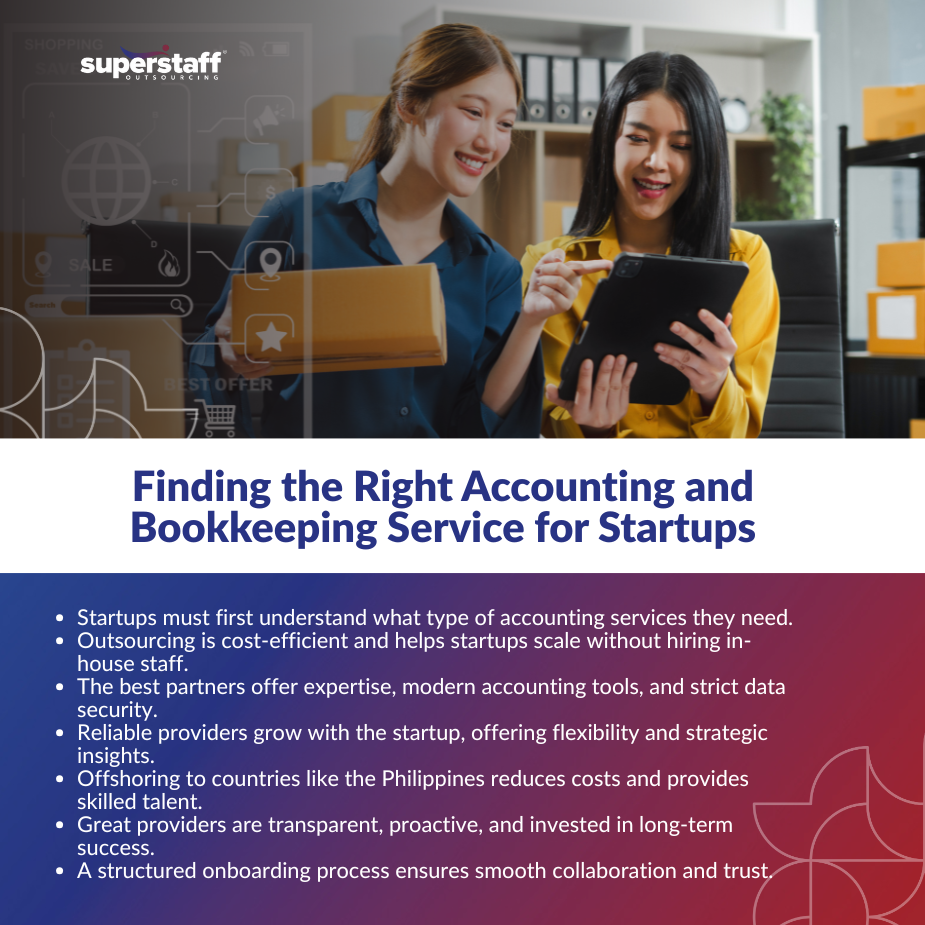
Launching a startup is an exciting but financially demanding journey. With limited resources, rapid growth targets, and strict compliance requirements, startups often find themselves juggling too many priorities at once. Managing finances accurately becomes one of the biggest challenges. This is where the right accounting and bookkeeping service for startups makes all the difference.
A reliable partner can help maintain financial organization, ensure investor confidence, and guide smarter decision-making. This guide walks founders through what to look for in an outsourcing partner—and how to choose one that fosters scalability, transparency, and long-term stability.
Every Successful Startup Begins with Financial Clarity
No startup can thrive without financial clarity. Before product development, marketing campaigns, or hiring plans, leaders must have a solid grasp of where their money is going and how much they have left. Proper bookkeeping and accounting are not just administrative tasks—they form the backbone of sound business strategy.
Accurate records help track cash flow and expenses, ensuring that startups never lose sight of their financial runway. A structured accounting process prevents overspending and flags potential financial risks early. For example, startups often face “cash flow gaps” when sales are high, but receivables take time to collect. A well-managed accounting system helps predict these gaps, enabling founders to plan financing or cost adjustments in advance.
Moreover, clean books build trust with investors and partners. Before funding a startup, investors closely examine its financial statements. Transparent, accurate records demonstrate professionalism and reliability—two traits investors value highly. Having a consistent accounting and bookkeeping service for startups can even make due diligence smoother, speeding up the fundraising process.
Lastly, precise accounting prevents financial errors that could hinder growth. From misreporting tax obligations to overlooking expenses, small mistakes can snowball into major financial setbacks. When a startup prioritizes financial clarity early, it builds the foundation for scalability and compliance.
Before choosing a provider, however, startups must understand exactly what kind of accounting services they need.

Different Startups Have Different Accounting Needs
No two startups operate the same way, and their accounting requirements reflect that. Some only need basic bookkeeping to track daily expenses, while others require full-service accounting with tax preparation, payroll management, and financial forecasting.
Basic bookkeeping includes recording transactions, reconciling bank statements, and maintaining ledgers. It’s the first layer of financial management every startup needs. But as operations expand, startups must upgrade from simple recordkeeping to full accounting, which provides more detailed analysis, cash flow projections, and compliance management.
How can you tell when it’s time to outsource? Look for these signs:
- Bookkeeping tasks are taking up too much of your team’s time.
- Financial data is scattered across spreadsheets and software tools.
- You struggle to prepare for tax season or investor reporting.
Outsourcing early allows startups to scale smoothly. The cost-efficiency of outsourcing for startups lies in avoiding the overhead of hiring full-time staff. The right accounting and bookkeeping packages for small businesses provide experienced professionals and access to advanced software—often at a fraction of the cost of building an internal finance team.
Once a startup identifies its accounting needs, the next step is to evaluate potential service providers and find one that truly aligns with its goals.
Choosing the Right Partner Goes Beyond Cost—It’s About Fit and Expertise
If you’re seeking affordable bookkeeping and payroll services, working with an offshore partner can be the ideal solution. However, choosing the right BPO often means looking beyond cost savings.
Price matters, but when selecting an accounting and bookkeeping service for startups, expertise and compatibility matter more. Founders should choose a partner that understands both the nuances of their industry and the unique pressures of a startup environment.
First, consider industry specialization. A startup in healthcare, for instance, faces strict data protection regulations that differ from those of an e-commerce business. A specialized provider ensures compliance and tailors reporting to the sector’s standards.
Second, the right partner leverages modern accounting software and automation tools. Cloud-based systems like QuickBooks, Xero, and NetSuite simplify reporting and enable real-time visibility. Leveraging automation and accounting software for startups minimizes manual errors, accelerates reconciliation, and enhances collaboration between startup founders and accountants.
Finally, data security and compliance should be non-negotiable. Financial data is sensitive; the provider must follow international standards such as ISO 27001 or SOC 2 for data handling and cybersecurity.
While affordability may attract startups initially, long-term value lies in a partner that grows with your business, adapting to changing needs and providing strategic insight.
A Reliable Partner Grows with Your Startup
Startups evolve rapidly. What begins as a two-person operation can turn into a thriving company with multiple revenue streams within a year or two. A top-performing accounting and bookkeeping service for startups should evolve alongside your growth.
The best partners can manage increased transaction volumes without compromising accuracy. As your startup scales, they should seamlessly integrate advanced analytics tools to handle payroll, invoices, and multi-currency transactions.
A reliable partner also provides financial insights that go beyond the numbers. They help founders interpret data to make strategic decisions, like optimizing budgets, planning tax-efficient structures, or evaluating market expansion. A good accountant is not just a recordkeeper—they’re an advisor who helps shape the company’s financial trajectory.
Flexibility is another hallmark of a great provider. The ideal partner offers scalable service plans that grow as your needs expand. Whether you need part-time bookkeeping support or full-time financial management, they should adjust seamlessly.
For startups planning to go global or diversify operations, offshoring offers a cost-effective way to access world-class accounting talent.
Offshoring Accounting and Bookkeeping Services—A Growth-Smart Move
Outsourcing financial operations to offshore teams has become a strategic move for startups aiming to scale faster and leaner. Countries like the Philippines and Colombia are now recognized hubs for global accounting services.
Why? Because offshoring offers cost savings without sacrificing quality. Startups can access experienced accounting professionals at significantly lower rates than hiring in-house staff in the U.S. or Europe. This allows founders to reinvest those savings into marketing, product development, or customer acquisition.
Offshore teams are also composed of skilled accounting professionals with English fluency and training in global standards such as GAAP (Generally Accepted Accounting Principles) and IFRS (International Financial Reporting Standards). This ensures compliance across multiple markets and simplifies global operations.
Beyond skill and cost, alignment with financial tools is another advantage. Offshore accounting professionals are proficient in using platforms like QuickBooks, Xero, and FreshBooks, ensuring smooth integration with existing systems.
Ultimately, the decision to offshore your accounting and bookkeeping service for startups goes beyond affordability—it’s about creating a sustainable growth model. However, to truly reap these benefits, startups must work with partners who share their vision and commitment to success.
The Ideal Partner Is Invested in Your Startup’s Success
The best outsourcing relationships feel like extensions of your internal team. Your chosen accounting and bookkeeping service for startups should not only deliver accurate numbers but also care about your growth trajectory.
A strong partnership begins with transparency in pricing and communication. Startups operate with limited budgets, so hidden fees or vague billing can derail trust. The ideal provider offers clear pricing structures and ensures every transaction or add-on service is documented.
Next, a great provider assigns dedicated account managers who act as your go-to experts. This personalized service makes collaboration seamless—especially when addressing urgent needs like investor audits or quarterly reporting.
The most effective partners are also proactive problem-solvers. They don’t just record data; they analyze it to uncover inefficiencies, alert you to potential compliance risks, and recommend solutions before issues escalate.
This collaborative, forward-thinking mindset transforms a vendor relationship into a true strategic partnership—one that fuels confidence and long-term stability.
When your provider aligns with your goals, you gain a dependable ally who grows with you. But how do you find and onboard such a partner effectively?
How to Choose and Onboard Your Accounting or Bookkeeping Partner
Selecting the ideal accounting and bookkeeping service for startups involves both careful evaluation and structured onboarding. Here’s a step-by-step approach:
- Define your goals and KPIs.
Identify what success looks like for your financial operations. Are you aiming for faster reporting, better cash flow visibility, or tax compliance support? Setting clear KPIs ensures alignment from day one. - Research and shortlist providers.
Look for firms with startup experience, transparent pricing, and strong client testimonials. Evaluate their technology stack and ensure they can integrate with your preferred accounting tools. - Request a trial or pilot period.
A short-term engagement allows you to test their responsiveness, accuracy, and communication style. This step can reveal whether they understand your business model and workflow preferences. - Establish data-sharing protocols.
Financial information is highly confidential. Use secure cloud-based systems and encrypted channels for document transfers and communications. - Create clear communication channels.
Regular check-ins—weekly or monthly—keep everyone aligned. A reliable accounting and bookkeeping service for startups should provide detailed reports and be open to strategy discussions. - Review and refine.
After the first quarter, evaluate performance against KPIs. Discuss what worked, what didn’t, and what improvements can be made for smoother collaboration.
When onboarding is done right, the transition feels effortless. The startup gains instant clarity, while the provider gains insight into business needs—building mutual trust from the start.
Looking for an Accounting and Bookkeeping Service for Startups? Turn to SuperStaff!
Choosing the right accounting and bookkeeping service for startups is more than a financial decision—it’s a strategic one. Early-stage businesses thrive when their finances are organized, transparent, and scalable. From identifying what services you need to finding a partner that understands your industry and growth goals, every step in the process sets the tone for future success.
A trusted partner not only handles day-to-day transactions but also provides insights that shape smarter decisions and stronger investor relationships. The right accounting support transforms numbers into strategy.
Partner with an outsourcing provider like SuperStaff to build a strong financial foundation for your startup—efficient, compliant, and ready for scale. With global expertise, flexible service models, and a commitment to client success, SuperStaff helps startups move from survival mode to sustainable growth.






